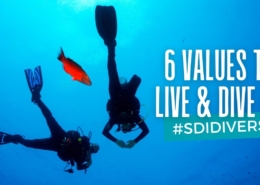Your Buddy – Your Gear?
Many years ago, I was busy working on some sort of essential task while a colleague taught an Open Water Scuba Diver academic session in our dive shop’s adjoining classroom. I stopped what I was doing when I heard him explain to the students that any dive buddy should always be considered a piece of equipment. I was confused and waited to hear more. After about ten minutes of discussion in the other room, I realized he had a unique way of teaching a critical piece of information.
So, why would you treat your dive buddy as a piece of equipment?
That was the first question that ran through my mind. Your buddy could be your wife, your child, your best friend. These people are far more important than dive gear! My problem was that I was thinking emotionally. Every time we teach, we demand pre-dive checks, buddy checks, and gear cleaning following water sessions. Even the Open Water Scuba Diver course exam has questions about proper regulator servicing and annual maintenance. We teach from the first moment that gear should be cleaned, serviced, and maintained. We require students to perform function checks and to check their dive buddy’s gear. This “check, clean, maintain” process is then taught in almost every scuba course of any type.
As a cave diver, rebreather diver, and public safety diver, my colleague recognized the only reason people can safely dive is because of the gear they carry. In every type of diving, each piece of core equipment is critical for differing reasons. If we apply this concept to our dive buddies, we gain a new perspective. If we enforce this concept from day one, it could create a safer connection between divers.
Gear health
First, we do not use dirty, corroded, or otherwise “nasty” equipment. Likewise, if our dive buddy is unhealthy, sick, or otherwise not a person you would want to be around, then you should probably call off any dive plans. You would be going diving with the knowledge that it may be an unsafe activity for your buddy.
Gear functionality
Second, our gear needs to be functional. If a buddy is about to go diving and he or she is intoxicated, mentally unsound, or physically injured, then we know they will not be safe underwater. They will not be dependable, and you will likely have to take responsibility for correcting any of their problematic actions.
Gear redundancy
Third, we carry all sorts of redundant items for different types of diving. Every diver carries two-second stage regulators to provide gas to someone else in case of an out-of-air emergency. Is your buddy not a backup for you? If you have a problem you cannot easily fix yourself, the buddy’s role is to assist you in maintaining a safe return home. This factor means your dive buddy is your ultimate redundant piece of dive gear.
So, the reality is that my colleague was correct. If we always look over our dive buddies the way we are taught to care for and check our equipment, then we are improving safety while treating that buddy like a critical component to any dive. That might even make someone’s “better half” willing to be called a piece of gear! Either way, this is one viewpoint on how to teach service, pre-dive checks, storage of gear, and buddy evaluation with one easy concept. This concept is something to laugh about while driving home critical safety topics to students who will likely remember the conversation years later. What are some interesting concepts you use to drive home teaching points to students? We would all love to hear about them!









Hagyjon egy választ!
Szeretne csatlakozni a beszélgetéshez?Nyugodtan járulj hozzá az alábbiakban!